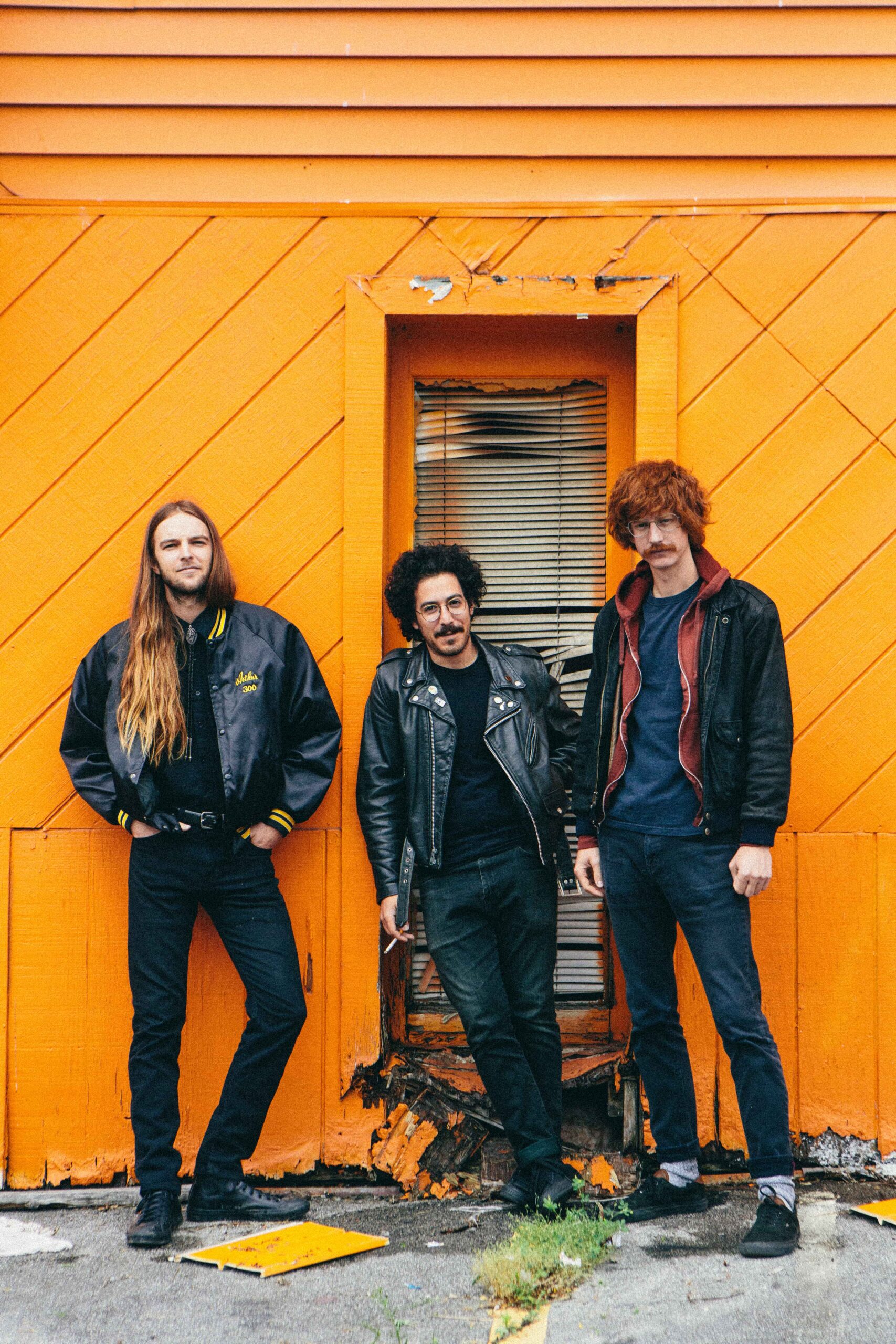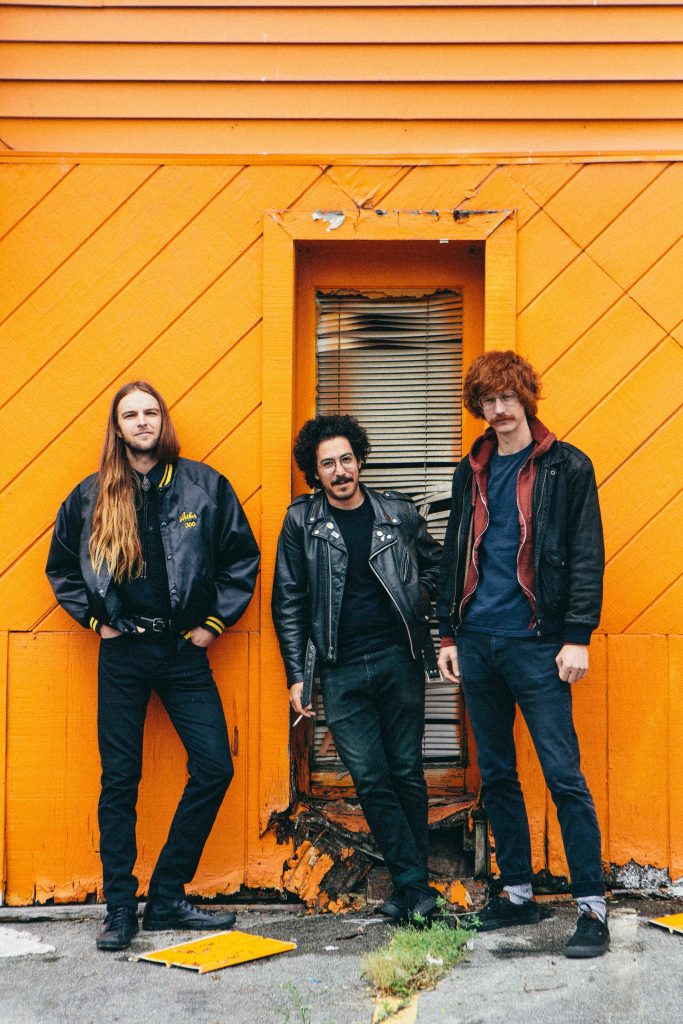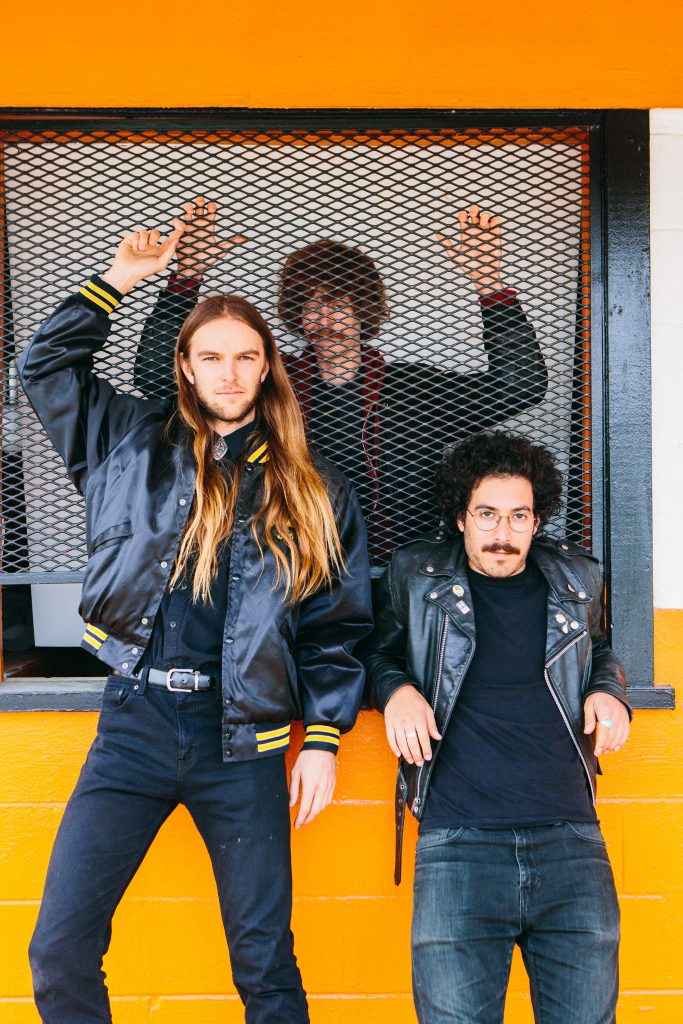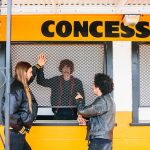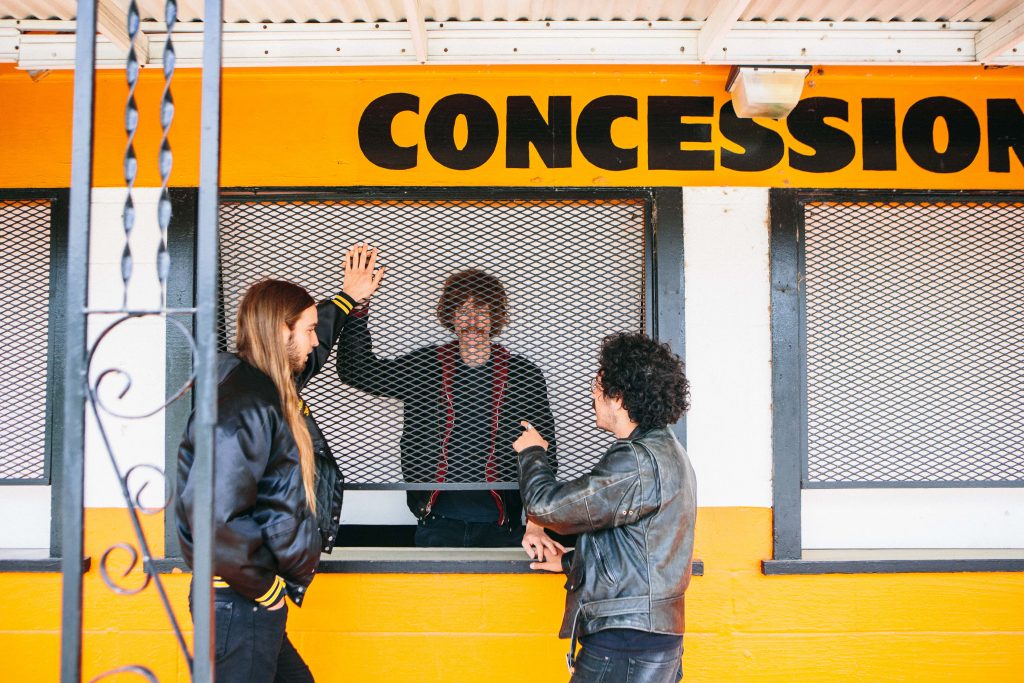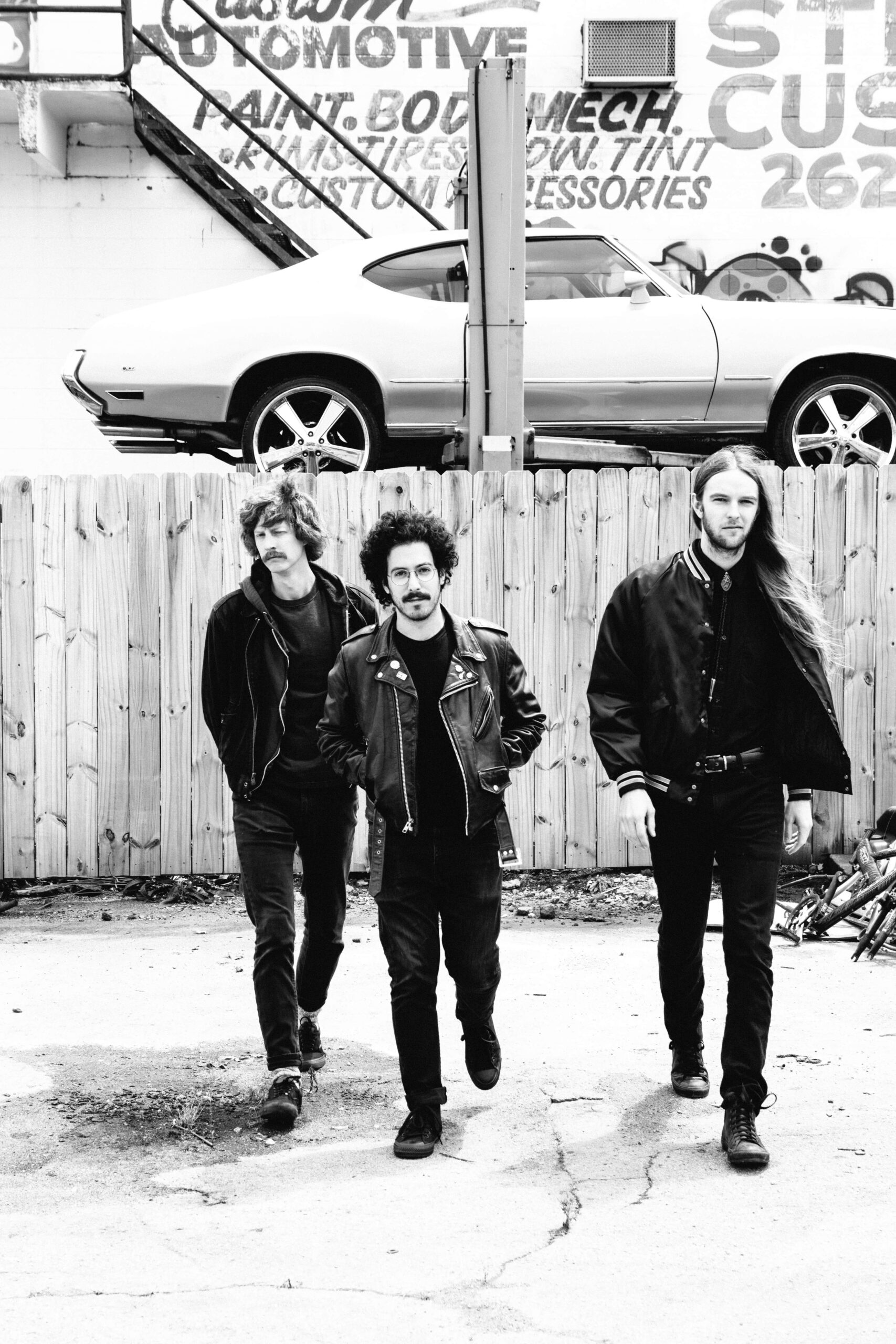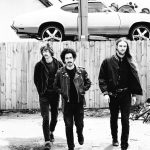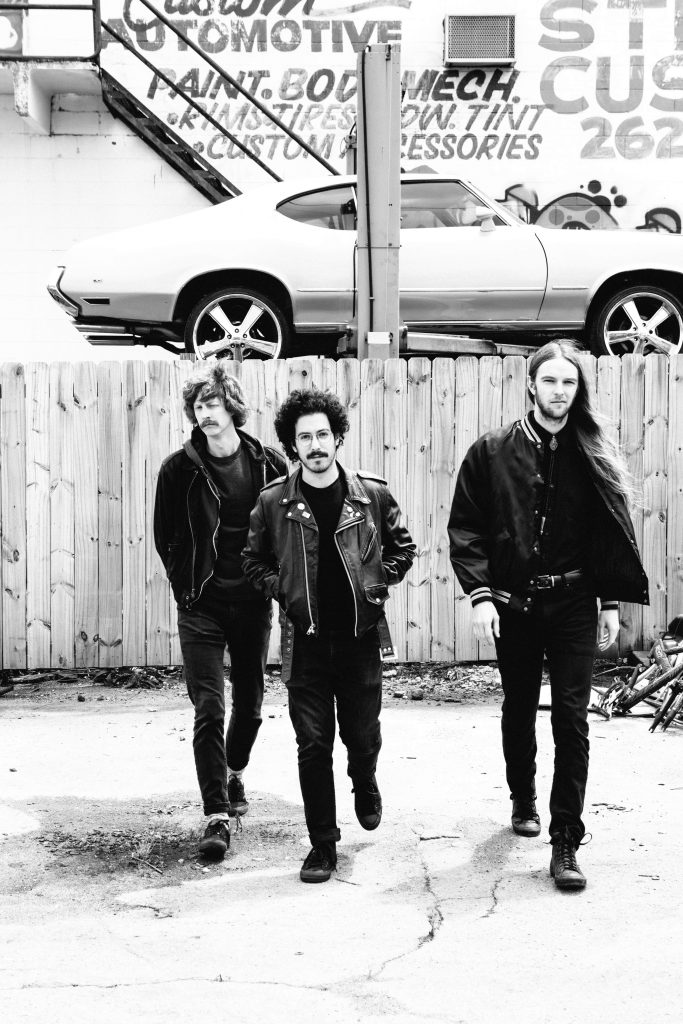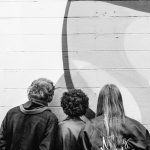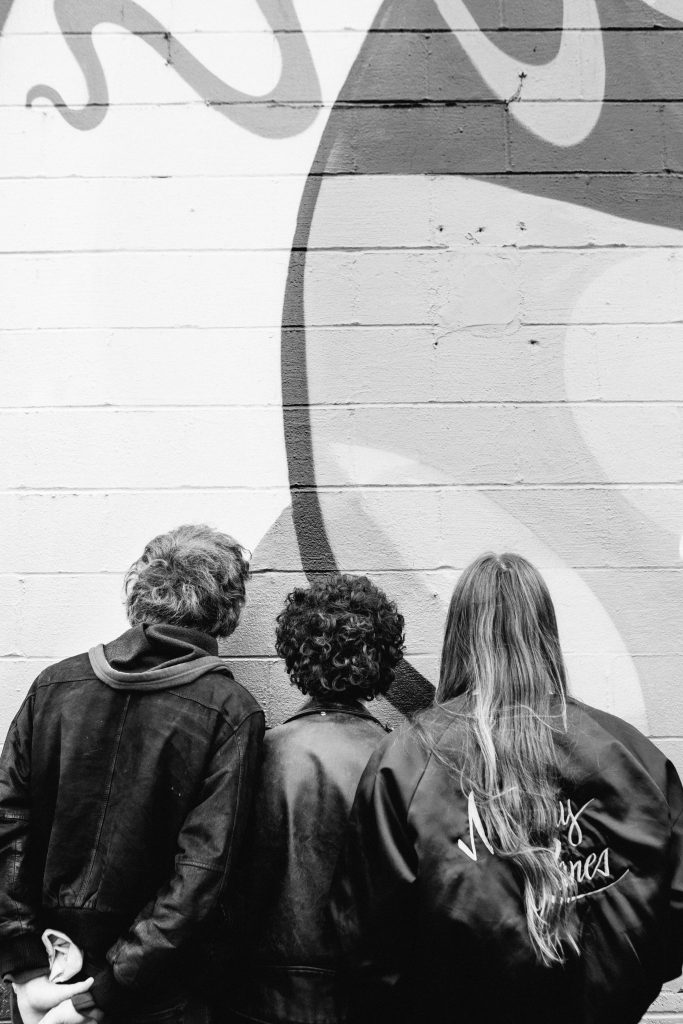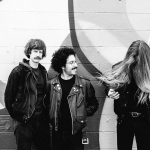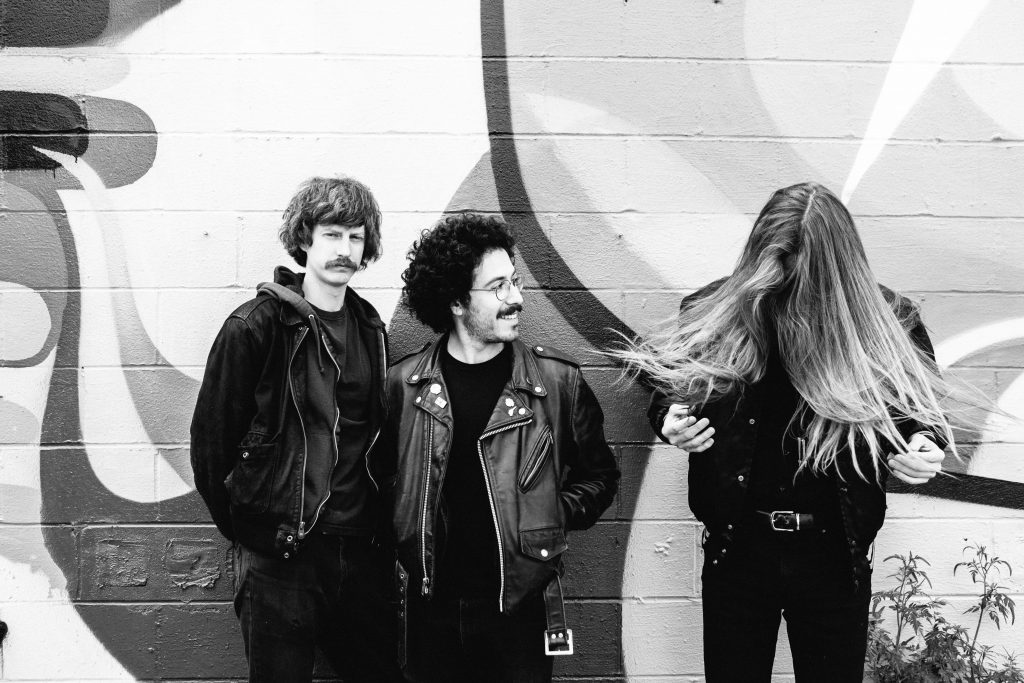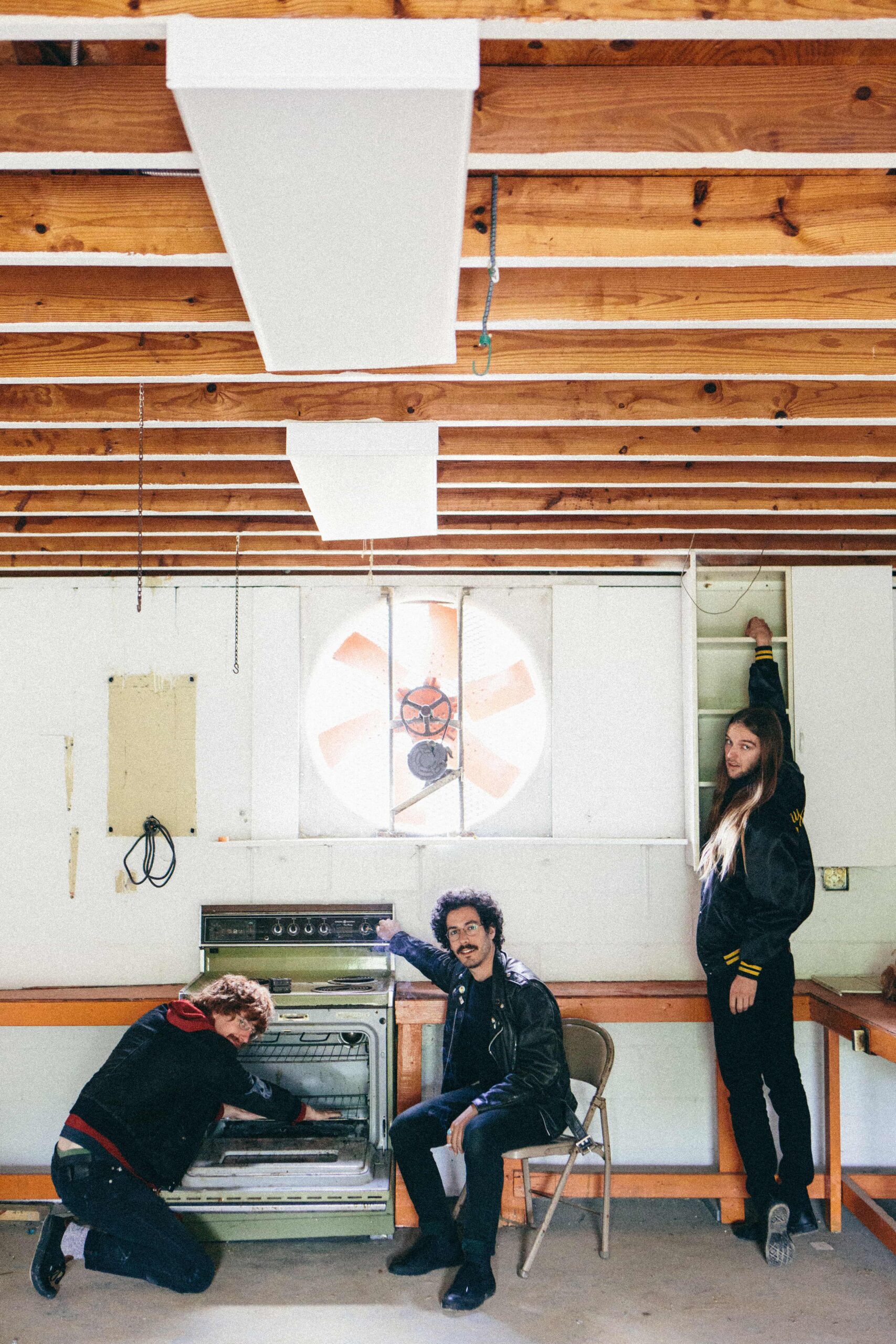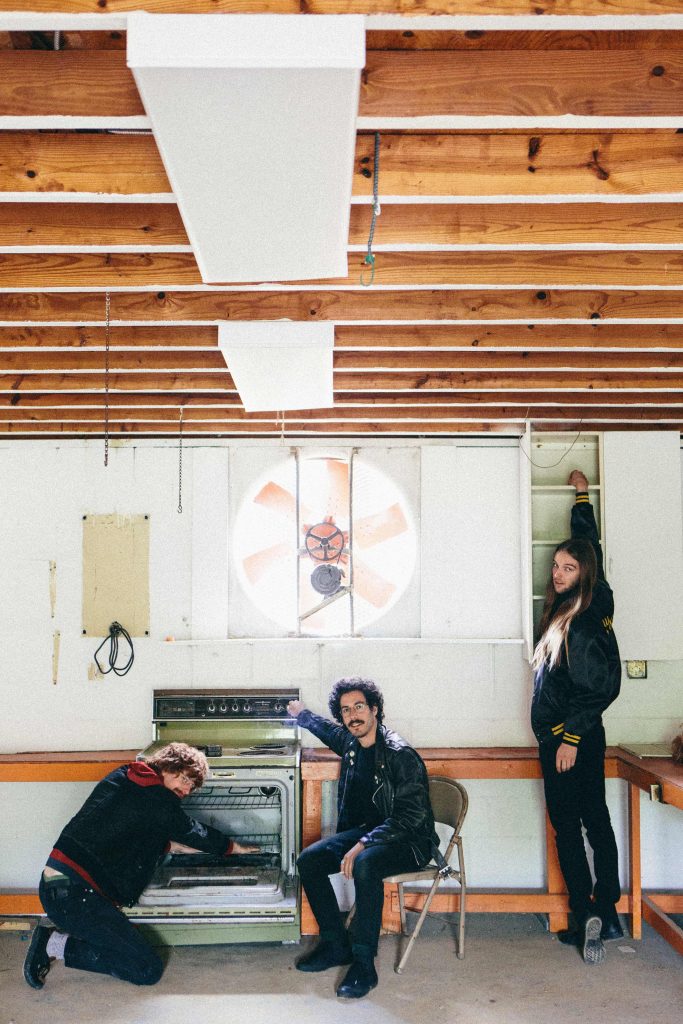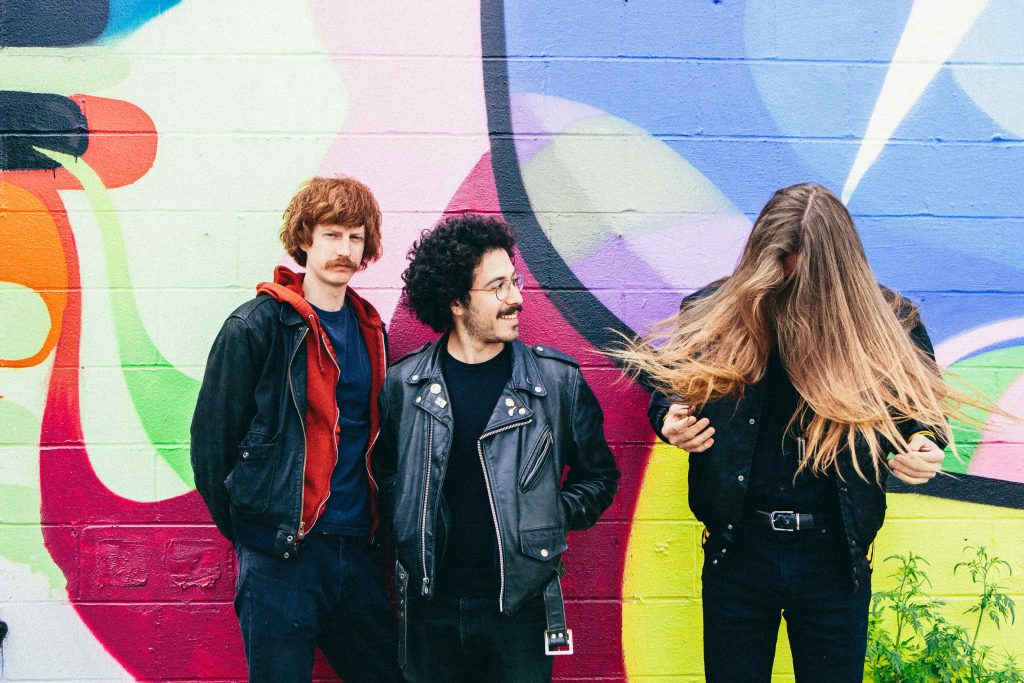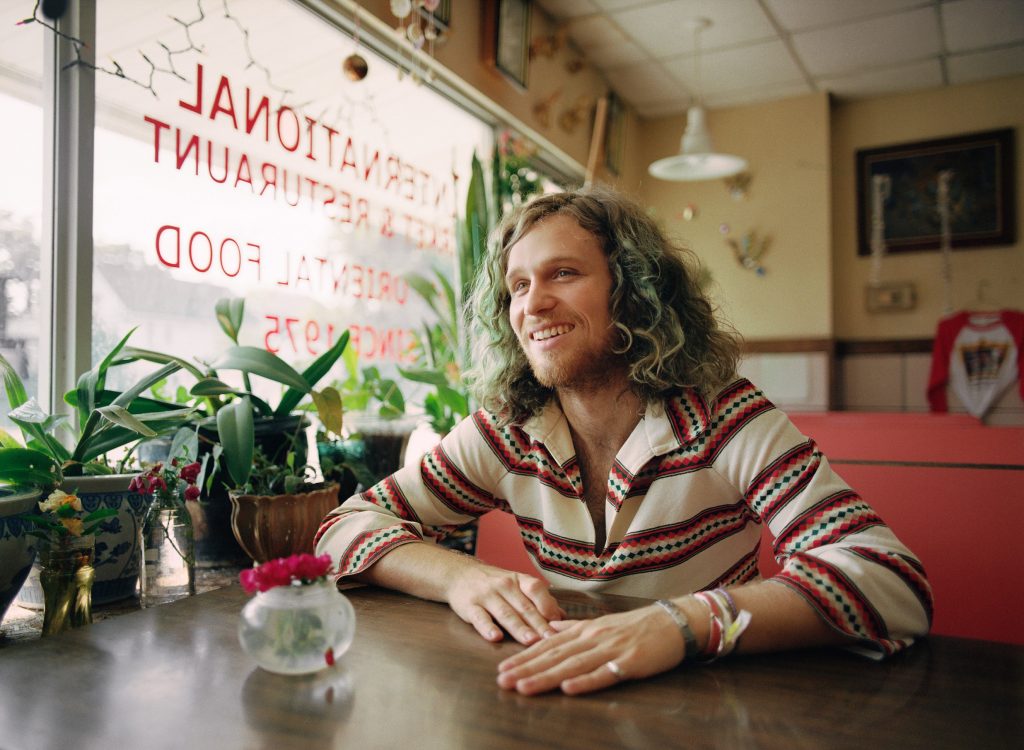
THE EAST ROOM OFF OF GALLATIN AVENUE IS PACKED, though it’s a little hard to tell exactly how packed, since at any given time there are just as many folks smoking cigarettes out back as there are jammed onto the venue’s main floor. But once the first chords ring out from Harry Kagan’s blonde, singlepickup Telecaster as his band, Music Band, tears into their set just minutes before midnight, everyone manages to push in through the back doors pretty quickly.
After years of hard work playing every show around town that would have them, Music Band’s debut album, Wake Up Laughing, just came out through Infinity Cat and Dine Alone Records—and damn near everybody who’s ever played on a bill with them is here to celebrate.
Harry and his bandmates—bassist Duncan Shea and drummer Lee Putney—are lined up at the front of the stage, filling every musical bar with the vigor only a three-piece can, accentuating beats in each line in perfect lockstep with one another. Their energetic brand of rock ‘n’ roll is catchy enough to hook you on the first taste, but most of us in this room have seen these guys at least half a dozen times by now, and we don’t need any convincing.
The crowd screams, howls, and banters along with the band through whole songs and the spaces in between. After the third or fourth song winds up, Harry hears something from the audience that makes him chuckle bashfully. “This is the one place I know we’ll always get heckled,” he says with a wry smile. “Here’s another track straight out of Nashville.” Harry bursts into album opener “Day Stealer,” singing, “I can be a stranger if I want to.” Well, maybe somewhere, but not here.
When I catch up to the boys again a few days later, they’re enjoying a rare afternoon off in the midst of a heavy touring schedule that by mid- 2016 will have taken them all across the United States and through quite a bit of Canada as well. We’re sitting around an end table on the back porch of Harry’s house, in a quiet neighborhood out past Trinity Lane. Harry leans back on a wooden director’s chair, scratching at the knife tattooed on his right forearm. “We just finished six weeks with Diarrhea Planet,” he nods his head toward Ian—the drummer for Diarrhea Planet—who’s sitting up against the glass door, trying to mind his own business. “And we’re about to leave again for the East Coast on Saturday or Sunday for like two weeks.” They’ve done stints on the road with a number of local acts, from labelmates JEFF the Brotherhood to Those Darlins. But on this next tour, they’ll be heading out all on their own, and they’re trying to get used to the idea of being a headlining band themselves.
If you pay much attention to the local DIY rock ‘n’ roll scene, you probably started bumping into Music Band a few years ago when they seemed to open a show every other week at the now-defunct (and sorely missed) Stone Fox on 51st. At first, their tongue-in-cheek name made it tempting to write them off as just another punky garage rock band playing weekend shows for fun, but they kept evolving month after month. Every show, they came back with more energy, a broader dynamic range, and catchier, more developed songs, until there was no denying that they were for real.
Though Music Band has grown by leaps and bounds over the past few years, they’ve been a band for much longer, and best friends for even longer than that. Harry, Duncan, and Lee first met in 2008 when they were all students at Ithaca College in upstate New York. The band came two years later, after the name came to Harry in an epiphany. “I remember I had started writing songs, and I was home in Chicago for a holiday from school,” he says. Sitting in his friend’s backyard, the name just came to him. He got his roommates in on the act, and next thing they knew Music Band was born.
There wasn’t much of a music scene in their small college town, so when touring bands came through to play at the college clubs, they were the de facto opening act. Their college friend Reece Lazarus—who now lives in Nashville and plays bass for local phenom Bully—was responsible for booking most of the shows in Ithaca, and even back then, he had a thing for Nashville bands. JEFF the Brotherhood, Those Darlins, Jessica Lea Mayfield, and Richie Kirkpatrick were just a few of the Nashville artists Music Band opened for while they were still in school.
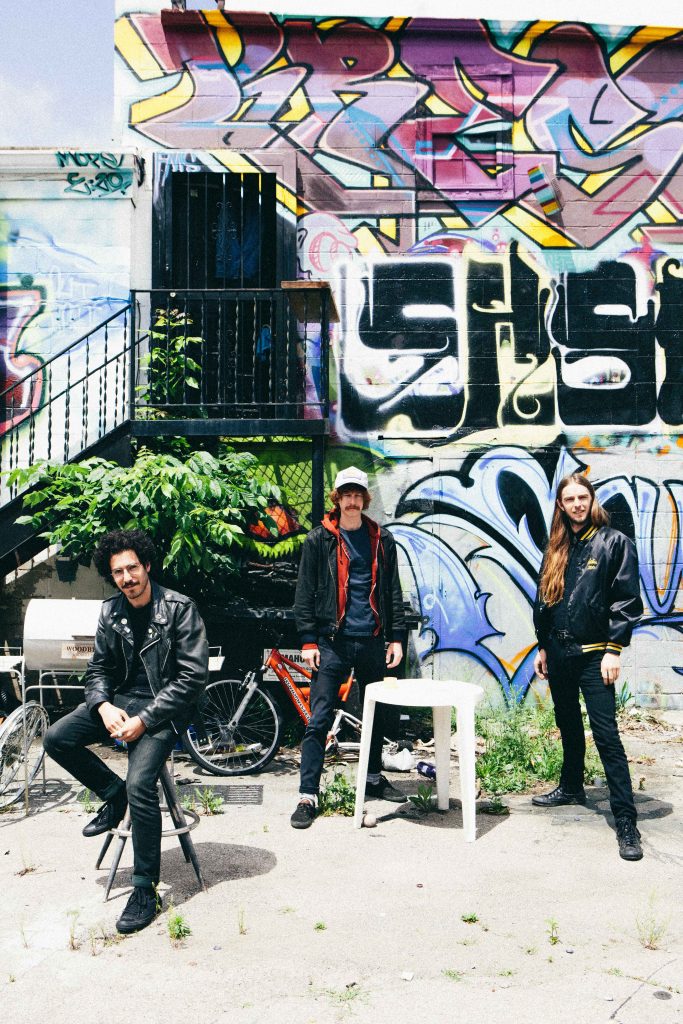
When they graduated and decided to keep playing music together, they knew they needed to find a new city where they could grow and hone their craft. After seeing firsthand how many good bands were coming out of Nashville, moving here was a no-brainer. Once they got into town, they kept living and playing music together, but they were careful not to move too fast. They even lived in town for nearly a year before playing out regularly. Eventually, Reece—who had since found a job booking shows at The Stone Fox—started to slip them onto bills when he could, and they made friends in the local scene show by show.
“Moving to a new place is all about how you approach an existing scene,” Harry says, leaning forward to knock the ash off a cigarette into the tray on the table. “People have been living here for a long time, doing what we want to be doing. And I think the unique thing about Nashville is the sense of community around likeminded people.” Through that community, they met people who helped them hone in on the music they wanted to make themselves. “Our music sounds a lot like the bands that we’re friends with and go to see at shows,” Duncan admits. “When people ask what our influences are— which is kind of a crazy question— I feel like it’s just bands that we’ve toured with and bands that we’re friends with.”
Although Music Band’s no-frills brand of rock ‘n’ roll certainly fits well within the local rock scene, they’ve got a sound and an attitude all their own. Much of that comes from Harry’s lyrics, which are humorous, clever, and above all, honest.
The album is full of wit and plenty of good one-liners—“Like a rock inside my shoe / I can’t seem to get to you,” off of “Raag, pt. 2” comes to mind. Even more often, Harry leads the listener down a familiar path but takes a sharp-tongued turn at the last second. “She’s all I ever wanted / if all I ever wanted was a lie,” he howls on “Day Stealer.” Many of the songs share a recurring sense of existential loneliness and vulnerability, and nowhere is this more palpable than on album highlight “Fortune Guns.”
“Sometimes I need a reminder / of what I’m doing here / If I close my eyes I might disappear,” Harry sings, as the drums build up steadily in the background, then drop out entirely. “Something bad has happened to me,” he continues softly. The song goes through ups and downs but closes out with a hopeful turn, as Harry sings confidently, “Something good is coming to me.” With his matterof-fact style, Harry never uses two words when one will do, and he isn’t afraid to state his feelings plainly— be they dour, hopeful, or somewhere in between.
But their willingness to lay it all on the line doesn’t preclude them from having a little fun, too, and that comes through clearly in their live show. Harry whips and thrashes about with the momentum of his guitar parts, and though Duncan and Lee are reserved by comparison, neither is afraid to move around when they come to a big part in the song. And all of that raw energy is presided over by their fourth bandmate—a plush toy of the cat Garfield that’s sat atop Harry’s Fender amp since their earliest shows. Harry adopted it as a totem years ago and has collected Garfield paraphernalia ever since. No matter how far they go, Harry will always put him up there, every show, for no good reason except that that’s just who he is.
Music Band isn’t afraid to be themselves, no matter who’s watching. This simple honesty—at times blithe and others brutal—is exactly what makes them so refreshing. They aren’t trying to be the coolest guys in the room; they’re just trying to give you a glimpse of their world, unfiltered and unafraid.
It’s a style that’s sincerely theirs, born organically out of being close friends for years. “There’s two ways of going about [starting a band],” Duncan says, looking up at the roof of the porch to get his thoughts together. “One is having your sound already figured out and being like, Okay, we need a synth player, we’re doing this style of music, this is marketable because of that, and this demographic of people is going to like it. And then there’s the total opposite where it just happens by circumstance. You’re friends with some people and you learn how to play the instruments that are sitting around in the living room, and then it sounds the way it does because of where you come from.”
Over the years they’ve contemplated bringing another musician into the fold, but the idea has never taken flight. The flexibility and transparency of a three-piece setup have become a central part of who they are as a band. “With three people, there’s a conversation going on musically, whether you like it or not,” Duncan says. “When you place restrictions on your creativity, ironically, it allows for more creativity to happen.”
That same less-is-more approach flows through everything the band does, and it’s one of the main reasons Wake Up Laughing turned out as well as it did. They cut the record in five days at Andrija Tokic’s The Bomb Shelter studio, which is probably most famous for being the place where Alabama Shakes recorded their now-classic debut, Boys & Girls. “We did a lot of overdubs on this record, but it wasn’t exactly what you’d expect,” Duncan says. “We didn’t double any guitars except for one song. Andrija’s production technique is not adding stuff, it’s more just taking things away to reduce it to its simplest form.”
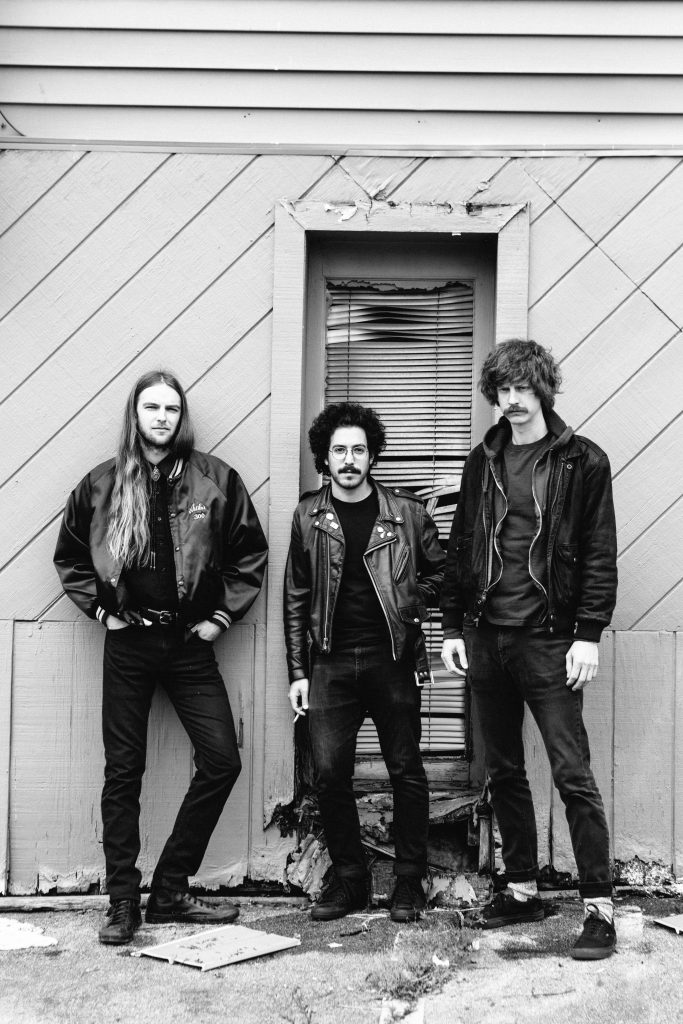
Though five days is nothing compared to how long some bands spend in the studio, it was the longest Music Band had ever spent on a recording by a long shot. They went in planning to experiment and add all sorts of layers and textures to their songs, but Andrija helped to steer them back to their roots. “[He] helped us realize that [with the extra studio time] we just had more time to spend making these songs sound as much like us as we can,” Harry says. That perspective was exactly what the band needed. They had been playing many of the songs on the record for a few years and had already built them up on the road—what they needed was to find the raw essence of the song and bring that to the fore. Plenty of rock bands hide their songwriting behind raw, fuzz-soaked soundscapes that glue everything together but make it hard to discern the individual parts. So while there’s no shortage of overdrive on this record, the album’s transparency is what really sets it apart—whether it’s in the lyrics or in the sonic landscape that supports them.
“Rather than try to make a record that was really niche, or really cool, it was important [to us] to do something that was a little more accessible,” Duncan says. “When we were mixing, we would just have the vocals a little more up front so people could listen to the lyrics more. We didn’t want it to sound super blown out or lo-fi. We didn’t want to mask the sound of the songs in selfconsciousness. We’re presenting them as they are.” Lee nods. “There’s truth in the record,” he says. “Yeah,” Duncan sighs, smiling, “but it’s also goofy.”
That’s the thing with Music Band— they’re fun, lighthearted guys who make honest music—and by that token, there’s plenty of fun in the music as well. The band’s willingness to indulge their sense of humor at times, and lay their emotions on the line at others, serves to make the music an even more accurate reflection of the people making it.
“A lot of the lyrics and the songwriting, they’re all from really personal experiences,” Harry says. “Writers always say the more specific you get when you’re writing, the more universal the things you’re saying can be.” And by holding such a clear lens up to their unabashed selves, Music Band reaches into the id of each of us to tease at something deep down that’s a lot like they are—fearless, honest, and not afraid to have a little fun.

